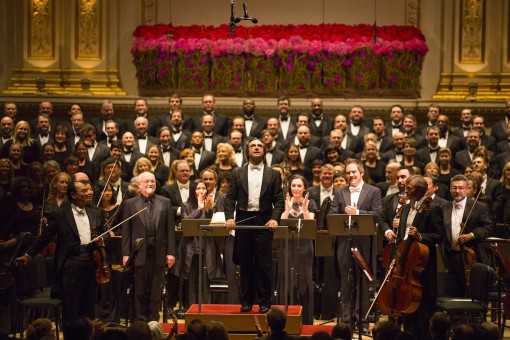Muti, Chicago Symphony open Carnegie season with a flawed yet riveting “Carmina Burana”

NEW YORK. Like sugar, Carl Orff’s Carmina Burana offers a rush that tends to come with a health warning these days. Experts are still undecided whether the irrepressibly popular oratorio was merely requisitioned to serve as the soundtrack to Nazi totalitarianism or whether something in its combination of primitive ingredients actively promotes the abdication of free will.
Riccardo Muti’s flawed but riveting performance of the work by the Chicago Symphony Orchestra, with which Carnegie Hall opened its season Wednesday night, presented the work as a huge machine that inexorably grinds onwards. At every turn it was the community—the splendid Chicago Symphony Chorus, the orchestra’s glorious brass section—that triumphed over the individual. Against that kind of collective power solo efforts faltered almost inevitably, like the exposed timpani in Floret silva, pulled out of tune by the heat of more than two hundred bodies packed tightly onto the stage.
There is a certain disregard for human frailty written into the score by a composer who consistently pushes his soloists outside of their comfort zones. The baritone has to sing falsetto, the tenor is pushed into the soprano range and the soprano, in Dulcissime, is made to leap an interval of a ninth up and then bidden to draw delicate ornaments at the extreme edge of her tessitura—all this after having sat still, with gradually cooling vocal cords, through the first 14 movements.
On Wednesday that particular task fell to Rosa Feola, a soprano with a sweet and youthful sound and exquisite purity of phrasing. The high jump in Dulcissime was an evident strain on her and the audience seemed to tremble with her, but she bravely held on. She sounded lovely in other arias that allowed a more organic flowering of the vocal lines.
It was an odd decision to cast a countertenor in the role of the singing roasted swan of Olim lacus colueram. Antonio Giovannini brought the right mix of humor and mock-pathos to it and produced an even and well-rounded sound. But, that, in a way, was missing the point. To cast a countertenor who is comfortably at home in this high register is to suppress the cruel joke Orff reserves for a tenor who has to squeeze himself into an ill-fitting vocal line, only to be mocked by a menacing male chorus. You might as well give the opening bassoon solo in the Rite of Spring to an oboe.
Baritone Audun Iversen, for his part, excelled at the cross-dressing part of his own role, singing the falsetto phrases of Dies, nox et omnia with unsettling beauty. His chest voice, too, was smooth and polished as he poured it into the modal lines of Circa mea pectora. But there was insufficient heft and dark swagger to his impersonation of the Abbot of Cucany.
There was swagger aplenty on the podium, where Muti marshaled the massive forces of the Chicago Symphony Orchestra and Chorus with a clear sense of direction and unflagging momentum. With uncompromising tempi and seamless transitions from one movement to the next he conjured an image of Fortuna’s constantly spinning wheel. The excellent chorus, directed by Duain Wolfe, provided some of the most arresting nuances of the evening, equally convincing in limpid, floating movements such as Chume, chum geselle min and in the earthy, lewd songs of the tavern section. The Chicago Children’s Choir sang with impressive musicianship and confidence from a balcony, a safe distance from the threatening power of Orff’s machine.
Posted in Performances





Posted Oct 06, 2012 at 3:26 pm by Brian Richardson
Corinna,
While I appreciate the artful prose of your review, I’m listening to the NPR broadcast of this CSO performance right now; and with respect to your comment about the exposed timpani “pulled out of tune” in floret silva, I would respectfully disagree! I hear this as a beautifully controlled performance by the CSO, lacking any semblance of bombast and overplaying. Intonation is what one would expect from one of the world’s elite orchestras.